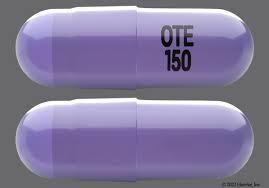Oteseconazole Interactions
There are 42 drugs known to interact with oteseconazole, along with 2 disease interactions, and 1 alcohol/food interaction. Of the total drug interactions, 2 are major, 38 are moderate, and 2 are minor.
- View all 42 medications that may interact with oteseconazole
- View oteseconazole alcohol/food interactions (1)
- View oteseconazole disease interactions (2)
Most frequently checked interactions
View interaction reports for oteseconazole and the medicines listed below.
- Acidophilus (lactobacillus acidophilus)
- Arnuity Ellipta (fluticasone)
- B-12 Plus Folic Acid (multivitamin)
- Benadryl Allergy (diphenhydramine)
- Breo Ellipta (fluticasone / vilanterol)
- Dexilant (dexlansoprazole)
- Diflucan (fluconazole)
- Durezol (difluprednate ophthalmic)
- EPA Fish Oil (omega-3 polyunsaturated fatty acids)
- Flexeril (cyclobenzaprine)
- Mucinex (guaifenesin)
- N-A-C Sustain (acetylcysteine)
- NeutraSal (saliva substitutes topical)
- Paxlovid (nirmatrelvir / ritonavir)
- ProAir HFA (albuterol)
- Quercetin (bioflavonoids)
- Rinvoq (upadacitinib)
- Ritalin (methylphenidate)
- Rutin (bioflavonoids)
- Sudafed 12 Hour Pressure+Pain (naproxen / pseudoephedrine)
- Sudafed Congestion (pseudoephedrine)
- Tirosint (levothyroxine)
- Topfit Vitamin B Complex (multivitamin)
- Tylenol (acetaminophen)
- Tylenol Extra Strength (acetaminophen)
- Visbiome Extra Strength (bifidobacterium infantis / lactobacillus acidophilus)
- Vitamin B12 (cyanocobalamin)
- Vitamin B2 (riboflavin)
- Vitamin D3 (cholecalciferol)
- Vitamin K (phytonadione)
Oteseconazole alcohol/food interactions
There is 1 alcohol/food interaction with oteseconazole.
Oteseconazole disease interactions
There are 2 disease interactions with oteseconazole which include:
More about oteseconazole
- oteseconazole consumer information
- Compare alternatives
- Side effects
- Dosage information
- During pregnancy
- Drug class: azole antifungals
- Breastfeeding
- En español
Related treatment guides
Drug Interaction Classification
| Highly clinically significant. Avoid combinations; the risk of the interaction outweighs the benefit. | |
| Moderately clinically significant. Usually avoid combinations; use it only under special circumstances. | |
| Minimally clinically significant. Minimize risk; assess risk and consider an alternative drug, take steps to circumvent the interaction risk and/or institute a monitoring plan. | |
| No interaction information available. |
See also:
Further information
Always consult your healthcare provider to ensure the information displayed on this page applies to your personal circumstances.


